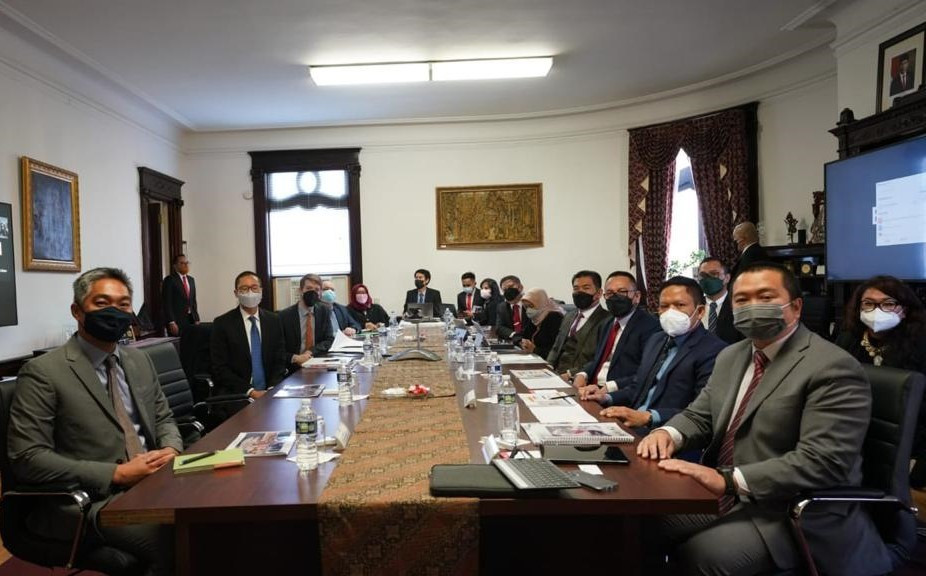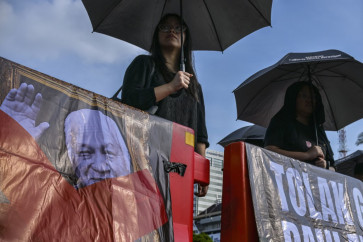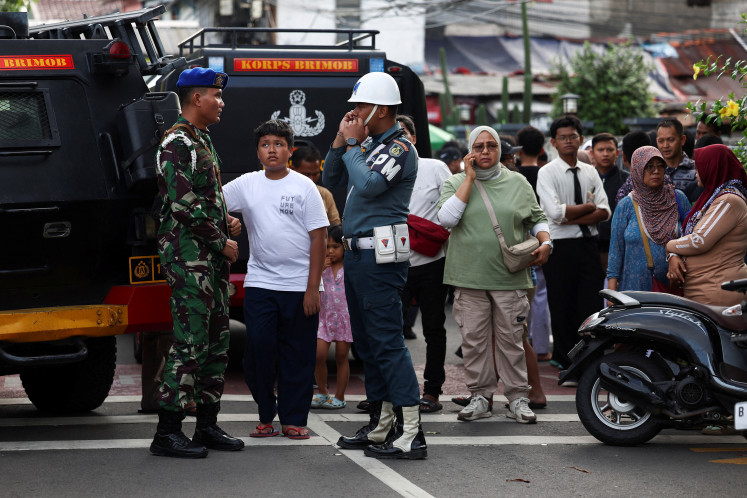Popular Reads
Top Results
Can't find what you're looking for?
View all search resultsPopular Reads
Top Results
Can't find what you're looking for?
View all search resultsIndonesia and USTR discuss significant efforts to leave Priority Watch List
The government is showing its commitment to combatting counterfeiting in Indonesia to encourage the national economy
Change text size
Gift Premium Articles
to Anyone
T
he government is showing its commitment to combatting counterfeiting in Indonesia to encourage the national economy. It is reflected in the initiative taken by the Directorate General of Intellectual Property (DGIP) and the National Police to meet the Office of the United States Trade Representative (USTR) and the United States Patent and Trademark Office (USPTO) on Wednesday in Washington, DC.
In the meeting, the government and USTR discussed further efforts to be taken by Indonesia to leave the Priority Watch List (PWL), a list of countries assessed as having serious intellectual property (IP) infringement issues.
“The removal of Indonesia from the PWL, or even Watch List, under Special 301 Report, which is issued by USTR, entails an essential role in increasing international trust, particularly for foreign investors,” explained Anom Wibowo, director of Investigation and Dispute Settlement as head of the Indonesian delegates, and chief of the Operations Task Force.
Sung Chang, director for Innovation and Intellectual Property at USTR presented a number of points related to IP law enforcement efforts for the government to work on.
“I am suggesting to increase the number of raids, confiscation of goods and disposition of evidence,” he said.
Responding to this suggestion, Anom said that the Indonesian government was prioritizing a persuasive approach initially, through public campaigns and IP dissemination. Should this approach fail and is ignored by perpetrators of IP infringement, either in online or offline markets, the government would move to a repressive approach.
Further, Sung Chang appreciated the website development to enable online access to case statistics and case progress. According to Anom the website is currently under development and expected to be launched in the next few months.
“Our third point is we hope that the shutting down of websites by the Communications and Information Ministry can be followed by an indictment. Therefore, it is necessary to further prosecute the case and not merely stop at shutting down the website, as well as with cases of customs and excise,” Sun Chang continued.
USTR also asked the government to pursue civil cases on trademark and industrial design counterfeiting. Regarding these three points, Anom said that the government encouraged rights owners to report any infringement that had not been processed to the DGIP, as IP enforcement in Indonesia is based on complaint offenses.
“We need data from USTR on complaints from the US industry to help us handle the complaints and share them with relevant ministries and agencies in the Task Force,” said Anom.
The next meeting with USPTO maintained the cooperation between Indonesia and the USPTO. The DGIP and USPTO will collaborate to enhance human resource capacity on intellectual property.
It is important to mention that by removing Indonesia from the PWL, the government hopes to have a bigger incentive arrangement with the Generalized System of Preferences for Indonesia. Lower duties as provided by the GSP would promote economic development in Indonesia with the growth of foreign investment.
The DGIP of the Law and Human Rights Ministry has previously taken several strategic steps. The DGIP leads the IP Operations Task Force consisting of five ministries and agencies, the National Agency of Drug and Food Control (BPOM), the Directorate of Customs and Excise of the Finance Ministry, the National Police and the Communications and Information Ministry.
The earlier Task Force comprised 17 ministries and agencies, but this was reduced to five to make it more effective and efficient in countering IP infringement. The Task Force has various programs covering regulation amendment, capacity enhancement for Civil Servant Investigators (PPNS), cooperation agreements, investigation tools and joint operations with other ministries and agencies.
During the past two months, the Operations Task Force has made significant changes to the cooperation agreement between ministries. The agreement is expected to provide a quick solution to the request of USTR to change the existing intellectual property regulations.










